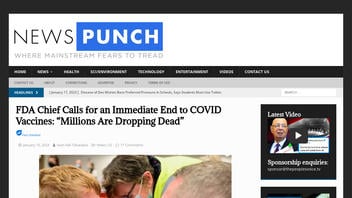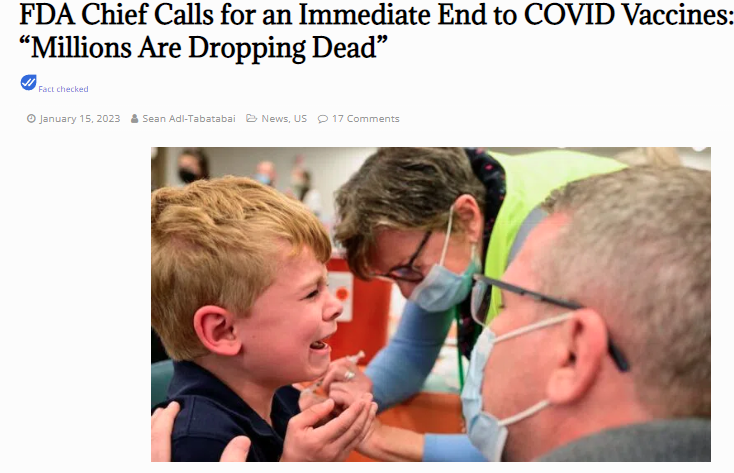
Did the chief of the Food and Drug Administration (FDA) call for an immediate end to COVID-19 vaccines? No, that's not true: The head of the FDA is Dr. Robert M. Califf and he is not mentioned in the article where the claim appears. The story instead refers to Dr. Paul Offit, who is a member of the FDA's vaccine advisory committee and also is the director of the Vaccine Education Center at Children's Hospital of Philadelphia. Neither physician has called for an "immediate end to COVID vaccines."
The claim appeared in an article published by NewsPunch on January 15, 2023, titled "FDA Chief Calls for an Immediate End to COVID Vaccines: 'Millions Are Dropping Dead.'" (archived here). It opened:
A senior FDA official has called for the immediate halt of COVID-19 vaccinations in America due to the alarming numbers of people suffering severe adverse reactions from the mRNA jabs.
This is what the post looked like on the NewsPunch website at the time of writing:
(Source: NewsPunch screenshot taken on Tue Jan 17 17:16:19 2023 UTC)
The NewsPunch story cites a "Perspective" article Offit wrote that appeared in The New England Journal of Medicine (NEJM). It's called, "Bivalent Covid-19 Vaccines -- A Cautionary Tale." Lead Stories reached out to Offit, and in a January 17, 2023, email he offered a sharp response to the claims in NewsPunch. He said:
You're kidding, right?
Millions aren't dropping dead.
I didn't call for an immediate withdrawal of COVID vaccines.
Not millions of deaths, not hundreds, not tens
The Centers for Disease Control and Prevention (CDC) website backs Offit up. It says reports of death after COVID vaccination are a tiny fraction of the total shots given:
Reports of death after COVID-19 vaccination are rare. FDA requires healthcare providers to report any death after COVID-19 vaccination to VAERS [Vaccine Adverse Event Reporting System], even if it's unclear whether the vaccine was the cause. Reports of adverse events to VAERS following vaccination, including deaths, do not necessarily mean that a vaccine caused a health problem. More than 665 million doses of COVID-19 vaccines were administered in the United States from December 14, 2020, through January 4, 2023. During this time, VAERS received 18,533 preliminary reports of death (0.0028%) among people who received a COVID-19 vaccine. CDC and FDA clinicians review reports of death to VAERS including death certificates, autopsy, and medical records. Continued monitoring has identified nine deaths causally associated with J&J/Janssen COVID-19 vaccination. CDC and FDA continue to review reports of death following COVID-19 vaccination and update information as it becomes available.
VAERS data
VAERS, which the CDC co-sponsors with the FDA, operates as a crude early warning system and not as a database for the quantification of specific outcomes following vaccination.
Anyone with internet access can add a report to the VAERS list of reports. The public access link to it expressly warns against unwarranted conclusions based on VAERS material because the list only provides a tally of unverified notes about any health event people experience after they are vaccinated.
The list itself cannot be used to prove or quantify, since all it shows is a chronological correlation, not the causal link that would be more difficult to establish. It's the equivalent of a police precinct's running "blotter" reports that may serve as a starting point for police work, not an endpoint.
No end to vaccines
In the same NEJM article, Offit did not call for an immediate end to COVID vaccines. He did, however, say America's public health agencies may want to rethink their recommendations for bivalent boosters because of their limited impact on the health of certain age groups after they're fully vaccinated. Offit wrote:
What lessons can be learned from our experience with bivalent vaccines?
Fortunately, SARS-CoV-2 variants haven't evolved to resist the protection against severe disease offered by vaccination or previous infection. If that happens, we will need to create a variant-specific vaccine. Although boosting with a bivalent vaccine is likely to have a similar effect as boosting with a monovalent vaccine, booster dosing is probably best reserved for the people most likely to need protection against severe disease -- specifically, older adults, people with multiple coexisting conditions that put them at high risk for serious illness, and those who are immunocompromised. In the meantime, I believe we should stop trying to prevent all symptomatic infections in healthy, young people by boosting them with vaccines containing mRNA from strains that might disappear a few months later.
About NewsPunch
NewsPunch has published numerous fake news articles in the past. Their Facebook page "The People's Voice" even lost its verification checkmark, according to a 2018 report from Media Matters For America.
The NewsPunch site's terms of use (archived here) also make it clear that the organization does not stand behind the accuracy of its reporting:
NEWSPUNCH, LLC AND/OR ITS SUPPLIERS MAKE NO REPRESENTATIONS ABOUT THE SUITABILITY, RELIABILITY, AVAILABILITY, TIMELINESS, AND ACCURACY OF THE INFORMATION, SOFTWARE, PRODUCTS, SERVICES AND RELATED GRAPHICS CONTAINED ON THE SITE FOR ANY PURPOSE.
Lead Stories' other debunks of claims made by NewsPunch can be found here. Additional Lead Stories fact checks of claims about COVID-19 vaccination can be found here.


















